#planned parenthood v. casey
Text
Joe Biden will sign legislation protecting access to abortion care into law if Democrats win control of Congress in midterm elections this fall.
In remarks to a Democratic National Committee event on 18 October, the President announced plans to sign a bill to codify Roe v. Wade protections on the 50th anniversary of the US Supreme Court decision – what he intends to be his first act of 2023.
In June, the nation’s high court struck down precedents established by Roe v. Wade and Planned Parenthood v. Casey that affirmed the constitutional right to abortion care.
Following the latest ruling, more than a dozen states have outlawed most abortions or severely restricted access to care, leading to the closures of dozens of clinics. Patients and providers across the US have warned of devastating consequences to losing access to legal abortion, while Democratic officials have made abortion rights central to their midterm campaigns as Republicans mull national abortion restrictions.
“If Republicans get their way with a national ban, it won’t matter where you live in America,” Mr. Biden said on Tuesday. “The only sure way to stop these extremist laws that have put in jeopardy women’s health and rights is for Congress to pass a law.”
Democrats would need to pick up several seats in the currently evenly split US Senate for abortion protections to prevail.
Mr. Biden also said he will veto any anti-abortion legislation passed by a Republican-controlled Congress.
The Democratic-led House of Representatives passed the Women’s Health Protection Act earlier this year, though Senate Republicans have repeatedly obstructed its introduction in that chamber. That bill would codify the right to abortion care as affirmed by Roe v. Wade.
House Democrats were only joined by three Republicans to pass the Ensuring Access to Abortion Act, which would protect the right of abortion patients who live in states that have outlawed or severely restricted care to travel to other states without risking prosecution or legal action in their home states.
The bill also would protect providers and others who help patients travelling out of state for their care.
Legislation would also shield interstate shipments of US Food and Drug Administration-approved drugs used for medication abortion, the most common form of abortion care, accounting for more than half of all abortions in the US.
In a briefing with reporters on Monday, White House press secretary Karine Jean-Pierre called Republican-led abortion restrictions “disturbing” and “very dangerous.”
“It’s backwards, again, it’s dangerous and it’s severe, in stark contrast to the President and the commitment that he has to leave these decisions between a woman and her doctor,” she said.
This fall, voters in several states will determine whether their state constitutions include explicit protections for abortion care, while elections for control of state legislatures, governors’ offices and secretaries of state will also determine the fates of abortion access across the US.
In his remarks on Tuesday, President Biden pointed to Kansas voters shooting down a recent anti-abortion ballot measure in that state, signalling the electoral consequences of the Supreme Court’s decision in midterm elections.
“One of the most extraordinary parts of [the Dobbs decision] was when the majority wrote, ‘women are not without electoral or political power.’ Let me tell you something – the Court and extreme Republicans who have spent decades trying to overturn Roe are about to find out,” he said.
#us politics#news#the independent#2022#president joe biden#biden administration#Democrats#codify roe#roe v. wade#abortions#reproductive rights#reproductive health#abortion is a right#planned parenthood v. casey#Women’s Health Protection Act#Ensuring Access to Abortion Act#food and drug administration#Karine Jean-Pierre#us supreme court#scotus#2022 elections#2022 midterms
893 notes
·
View notes
Text
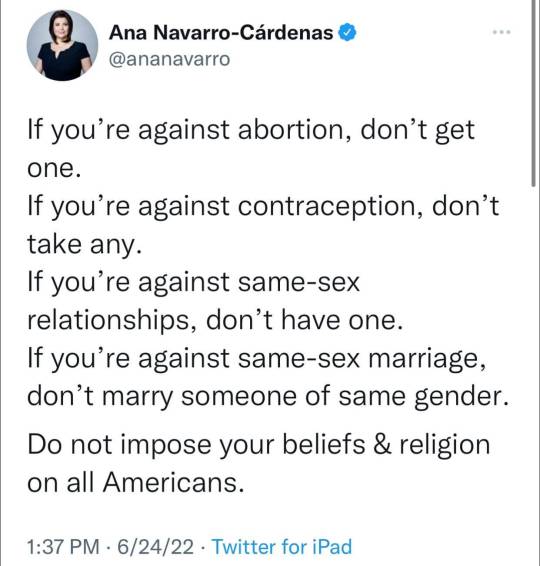
#us politics#twitter#tweet#ana navarro#Ana Navarro-Cárdenas#2022#roe v. wade#dobbs v. jackson women’s health organization#planned parenthood v. casey#abortions#abortion bans#contraceptive bans#contraception bans#contraceptives#lawrence v. texas#obergefell v. hodges#us supreme court#scotus#same sex marriage#equal rights#lgbtqia+#lgbtqia+ rights#griswold v. connecticut
1K notes
·
View notes
Text
Abortions in America
The history of abortion rights in the United States now come down to three cases in the Supreme Court of the United States (SCOTUS). A Supreme Court decision is not meant to make new laws, but rather to ensure that existing laws are compliant with the US Constitution.
The first decision were released on the same day as another abortion case. Doe v. Bolton (1973) and Roe v. Wade (1973) were both released on January 22nd. Doe v. Bolton overturned the abortion law in the state of Georgia. Roe v. Wade was the landmark decision (meaning a decision that substantially changes the interpretation of law) that allowed abortion based on the Due Process Clause of the Fourteenth Amendment, guaranteeing a right to privacy. The Court classified abortions as a fundamental right. The Fourteenth Amendment reads as follows; the Due Process Clause has been bolded.
No State shall make or enforce any law which shall abridge the privileges or immunities of citizens of the United States; nor shall any State deprive any person of life, liberty, or property, without due process of law; nor deny to any person within its jurisdiction the equal protection of the laws.
The Fifth Amendment also has a Due Process Clause. The Fifth Amendment reads as follows; the Due Process Clause has been bolded.
No person shall be held to answer for a capital, or otherwise infamous crime, unless on a presentment or indictment of a Grand Jury, except in cases arising in the land or naval forces, or in the Militia, when in actual service in time of War or public danger; nor shall any person be subject for the same offence to be twice put in jeopardy of life or limb; nor shall be compelled in any criminal case to be a witness against himself, nor be deprived of life, liberty, or property, without due process of law; nor shall private property be taken for public use, without just compensation.
The next decision was Planned Parenthood v. Casey (1992), another landmark case, where the Court upheld the right to an abortion but refined some of the court ruling. Under Casey, states could not craft an 'undue burden' on someone seeking an abortion, including requiring spousal approval. Parental consent for minors and mandatory waiting periods were still allowed.
Since then, the abortion has been considered "legally settled", meaning that the Constitution, the supreme law of the land, allowed abortions.
On June 24th, 2022, the Supreme Court released another landmark decision, Dobbs v. Jackson Women's Health Organization (2022). This holds that the Constitution does not confer a right to abortion and that abortion decision can be the jurisdiction of states rather than individuals. Due to 'trigger laws' that went into effect immediately, abortion is now illegal in 5 states, soon to be illegal in 11 more, and under question in some others (mostly states that kept their pre-Roe abortion laws on the books but stopped enforcing them).
Since 1977, there have been 3 kidnappings, 11 murders, 13 wounded, 17 attempted murders, 41 bombings, 153 incidents of assault of battery, 373 physical invasions, and 383 death threats (note: statistics are from the National Abortion Federation and include the US and Canada, the majority are in the US).
The right to privacy from the Due Process Clause of the Fourteenth Amendment is foundational in other Supreme Court cases that may be reviewed, including the right to contraception (Griswold v. Connecticut 1965), interracial marriage (Loving v. Virginia 1967), right to same-sex marriage (Obergefell v. Hodges 2015).
#history#roe v wade#scotus#dobbs v. jackson women’s health organization#abortion#prolife#prochoice#planned parenthood v. casey#us history
104 notes
·
View notes
Text
I highly encourage any Americans who see this to visit mothersdaystrike.com to get information on what our next steps should be regarding the Roe v. Wade decision. The website also gives some options for if you’re unable to strike. And of course, if you’re of age, vote “no” on August 2nd! Spread the word! This isn’t only about abortions; Roe v. Wade contains a lot of groundbreaking stuff regarding progressive policies, trans bodies, fertility treatments, and gay rights. This is so important and so serious right now
#roe vs. wade#roe v wade#planned parenthood v. casey#planned parenthood#pro choice#abortion#reproductive rights#trans#gay rights#lgbtq#protest#strike#my body my choice#civil rights#resources#supreme court
75 notes
·
View notes
Text

#us politics#news#politico#us supreme court#scotus#roe v wade#Justice Samuel Alito#planned parenthood#Planned Parenthood v. Casey#justice clarence thomas#justice neil gorsuch#justice brett kavanaugh#justice amy coney barrett#justice stephen breyer#justice Sonia Sotomayor#justice Elena Kagan#Dobbs v. Jackson Women’s Health Organization#us constitution#Justice Ruth Bader Ginsburg#laurence tribe#14th amendment#us history#2022#biden administration#abortion is better than negligence#abortion is a human right#abortion is a right#abortion is not a crime#abortions#abortion bans
4 notes
·
View notes
Text
Just another big old fuck you to 2016 non voters.
Well, it’s official, Roe and Casey have been overturned. So just another big fuck you to voters who thought a vacant Supreme Court seat wasn’t worth voting for.
Women will die now thanks to your idiocy.
But for people that actually care, harness your rage, get people to register, help spread the word, and go and fucking vote in the midterms. The GOP can only win if we give up to despair; don’t let that happen.
#Roe v. Wade#Planned Parenthood v. Casey#Fuck you non voters of 2016#You fucked the lives of women all over the country#Abortion#Vote Blue no Matter Who#Midterms#Dobbs v. Jackson Women's Health
15 notes
·
View notes
Text
My heart is absolutely broken for my friends in the USA. I cannot imagine what you're going through, I can only stand in solidarity with the women and others who will be negatively impacted because of this ruling. I am so sorry guys.
11 notes
·
View notes
Text
Kind of worried about state border patrols, and the fact that the formation of safe haven states and all that will begin to call into question the right to travel. I haven't seen many Supreme Court cases discussing travel between states in terms of jurisdiction and differing laws. I'm looking them up and all I can see are ones about international travel or immigration. The only case I can think of as of now is Dred Scott v Stanford which is kind of terrifying to think of for obvious reasons. Even if the 13th amendment definitely overturns it since the ruling concerned slavery, the 14th amendment also overruled it. So the fact that the 14th amendment is being reinterpreted can very much allow for certain aspects of the ruling to be reconsidered as precedent.
Some limitations of this argument are listed below:
I genuinely might be pulling shit out of my ass though, so I'm not sure— and I'm sorry if this steps on any toes because I know slavery is a very sensitive issue. It's just that this is genuinely the only Supreme Court ruling I can find at the moment that discusses matters similar to this, and it is concerning that it's THIS case in particular.
This might also be using the slippery slope fallacy, but in legal settings it is VERY important to consider how easily things can become black and white. The controversial history of the anti censorship movement within the US is an excellent example of this, and I highly encourage anyone look into it if they're interested in understanding why legal issues can become so easily polarized
#okay to rb#abortion#pro choice#abortion rights#roe v wade#planned parenthood v. casey#roe v. wade#reproductive rights#anti choice#supreme court
5 notes
·
View notes
Text
...Into The Void: Issue 008 "What did you think would happen?!"
The only thing 'egregiously wrong from the start' is the complicity that brought us to challenge women's reproductive rights.
On women's rights, bodily autonomy and liberty as stated in the constitution, the fundamental right of healthcare (FYI, abortion is healthcare), criminalization of women and advocates seeking abortion, and stripping the voting rights of people with felony records (aka: the long con)
I'm so sick to death of the Supreme Court's leaked opinion on Dobbs v Jackson and Congress' anemic response.
For fuckin' shame.
1. The decision of Roe vs Wade is not a radical left position, it's a moderate position that protects the many nuanced instances in which you may terminate a pregnancy that states laws define as abortion. See point #2
2. Late-term abortion, as Republicans and Theocrats like to hyperfocus on, was never the core issue in Roe v Wade. It was always about ensuring early trimester rights to healthcare, and — in the modern context — protecting individual liberties from states' TRIGGER LAWS (Alabama, Arkansas, Idaho, Kentucky, Mississippi, Missouri, etc): those in Texas banning abortion after six weeks with the exception of life-threatening illness and injury to the mother; criminalizing abortion, those who seek it for themselves and medical professionals who assist them; it opens the door for even more oppressive and invasive legislation that criminalizes childbirth outcomes like miscarriage, environmental contributing factors, and restricts access medical procedures that carry an increased risk of miscarriage — including medical testing — by threatening to prosecute the professionals who administer them.
3. Felons can't vote, and based on the state that restriction may be temporary or permanent. Criminalizing abortion is yet another way to suppress the vote, chipping away at voters' rights protections which were already feeble to begin with. It strips women of their agency to have a voice in the legislation that effects them which is exponentially detrimental to the theft of more of their rights.
4. To those people who prioritize individual liberties over 'big government' federal power/jurisdiction as an rationale to opposing Roe v Wade: What TF do you think bodily autonomy is?! Without bodily autonomy, how can you have individual liberty?
5. Justice Alito's comments in the leaked Dobbs v Jackson opinion which undermines Roe v Wade are "these are not rights that are deep rooted in history." This opens the door to 'Constitutional loyalists/originalists' to radically interpret the Constitution to fit personal political bias by eroding any/all modern human rights that their political ideology takes offense to. Like marriage equality. If you think they won't, if you think word choice is just coincidental, then you aren't paying enough attention.
6. You cannot look at the states' prohibitive legislation toward legal and safe abortion, yet without access to affordable childcare, family planning, lack of universal healthcare in the face of life-altering childbirth and hospitalization expenses, dramatically undercut welfare programs — on the cycle of systemic violence toward women and children goes — as anything other than a class war attack on the working class, indebted, and impoverished.
7. With this impending backslide in the high court, I look at the balancing branch of Congress with a fair amount of anger and contempt for Republican and Democratic self-serving representatives alike.
Within my job we train in CPI, crisis prevention and intervention. I swear to goodness that every single Democratic member of Congress needs an intensive course! They cannot use a decision model to assess risk and severity (and here we are in the red zone of both a high probability and severely harmful outcome) in order to act. And for the life of us all, they refuse to read the room regarding an escalating, Republican-fueled crisis on healthcare as a fundamental right. On women's rights. Old guard Democrats are still trying to offer support and renewed rapport to Republican colleagues, not acknowledging that it's a vastly inappropriate response to the level of behavior that the rest of the world can see: Republicans are engaged in risk behavior that endangers the American people by they're continuous refusal to reason and intimidation and the ONLY appropriate response is direct a course and decisively intervene.
Except Democrats in Congress don't have the **** force of will! Not to bring rogue party members to heel with opposition about their personal enrichment. Not to endorse candidates —like Jessica Cisneros, Nina Turner, etc — that challenge the status quo against laxidasical incumbents like Henry Cuellar and Shontel Brown. Not to shore up a "big tent" that is in danger of collapse in the midterms under the burgeoning weight of complicity. Not to protect bodily autonomy or fundamental rights.
For shame Republicans, who put out quotes like (the photo below) "my confidence in the court has been rocked / it would be completely inconsistent." What did you think would happen if you applied just a little bit of foresight?! For shame Democrats that put out quotes like the need for "strong Republicans."
For shame Congress. When are you going to show up for the people?
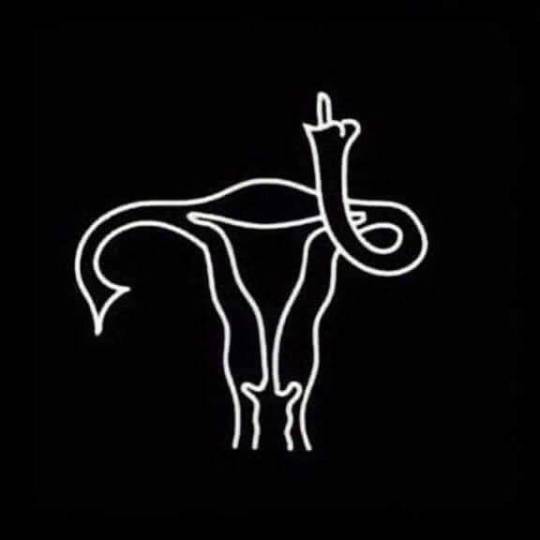
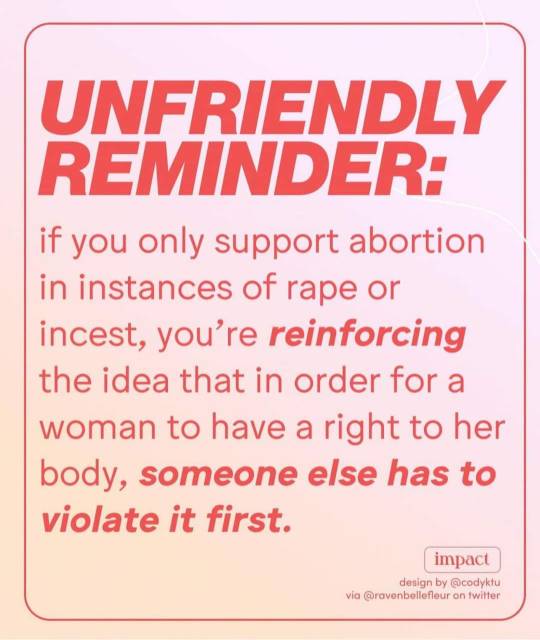
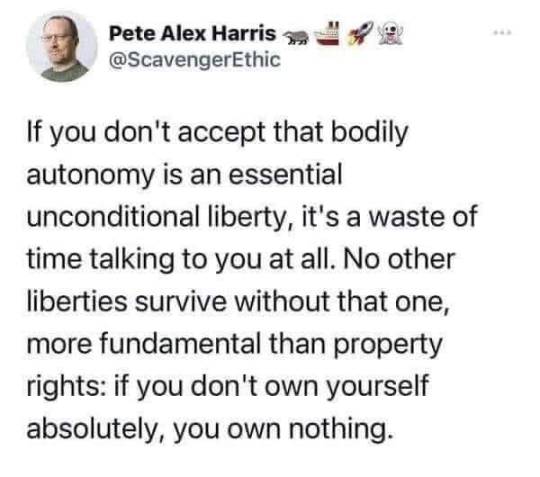
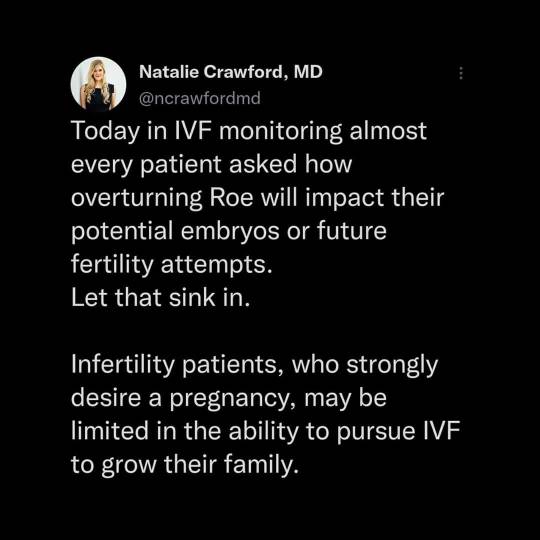



#political commentary#into the void#sociopolitical#human rights#women's health#healthcare rights#roe v wade#planned parenthood v. casey#abortion#the criminalization of women's rights#dobbs v. jackson women’s health organization#Democratic party failure#republican crisis#democrats in congress are full of shit#SCOTUS
2 notes
·
View notes
Text
The Supreme Court has voted to strike down the landmark Roe v. Wade decision, according to an initial draft majority opinion written by Justice Samuel Alito circulated inside the court and obtained by POLITICO.
The draft opinion is a full-throated, unflinching repudiation of the 1973 decision which guaranteed federal constitutional protections of abortion rights and a subsequent 1992 decision – Planned Parenthood v. Casey – that largely maintained the right. “Roe was egregiously wrong from the start,” Alito writes.
“We hold that Roe and Casey must be overruled,” he writes in the document, labeled as the “Opinion of the Court.” “It is time to heed the Constitution and return the issue of abortion to the people’s elected representatives.”
Deliberations on controversial cases have in the past been fluid. Justices can and sometimes do change their votes as draft opinions circulate and major decisions can be subject to multiple drafts and vote-trading, sometimes until just days before a decision is unveiled. The court’s holding will not be final until it is published, likely in the next two months.
The immediate impact of the ruling as drafted in February would be to end a half-century guarantee of federal constitutional protection of abortion rights and allow each state to decide whether to restrict or ban abortion. It’s unclear if there have been subsequent changes to the draft.
No draft decision in the modern history of the court has been disclosed publicly while a case was still pending. The unprecedented revelation is bound to intensify the debate over what was already the most controversial case on the docket this term.
The draft opinion offers an extraordinary window into the justices’ deliberations in one of the most consequential cases before the court in the last five decades. Some court-watchers predicted that the conservative majority would slice away at abortion rights without flatly overturning a 49-year-old precedent. The draft shows that the court is looking to reject Roe’s logic and legal protections.
“Roe was egregiously wrong from the start. Its reasoning was exceptionally weak, and the decision has had damaging consequences. And far from bringing about a national settlement of the abortion issue, Roe and Casey have enflamed debate and deepened division.”
Justice Samuel Alito in an initial draft majority opinion
A person familiar with the court’s deliberations said that four of the other Republican-appointed justices – Clarence Thomas, Neil Gorsuch, Brett Kavanaugh and Amy Coney Barrett – had voted with Alito in the conference held among the justices after hearing oral arguments in December, and that line-up remains unchanged as of this week.
The three Democratic-appointed justices – Stephen Breyer, Sonia Sotomayor and Elena Kagan – are working on one or more dissents, according to the person. How Chief Justice John Roberts will ultimately vote, and whether he will join an already written opinion or draft his own, is unclear.
The document, labeled as a first draft of the majority opinion, includes a notation that it was circulated among the justices on Feb. 10. If the Alito draft is adopted, it would rule in favor of Mississippi in the closely watched case over that state’s attempt to ban most abortions after 15 weeks of pregnancy.
A Supreme Court spokesperson declined to comment or make another representative of the court available to answer questions about the draft document.
POLITICO received a copy of the draft opinion from a person familiar with the court’s proceedings in the Mississippi case along with other details supporting the authenticity of the document. The draft opinion runs 98 pages, including a 31-page appendix of historical state abortion laws. The document is replete with citations to previous court decisions, books and other authorities, and includes 118 footnotes. The appearances and timing of this draft are consistent with court practice.
The disclosure of Alito’s draft majority opinion – a rare breach of Supreme Court secrecy and tradition around its deliberations – comes as all sides in the abortion debate are girding for the ruling. Speculation about the looming decision has been intense since the December oral arguments indicated a majority was inclined to support the Mississippi law.
Under longstanding court procedures, justices hold preliminary votes on cases shortly after argument and assign a member of the majority to write a draft of the court’s opinion. The draft is often amended in consultation with other justices, and in some cases the justices change their votes altogether, creating the possibility that the current alignment on Dobbs v. Jackson Women’s Health Organization could change.
The chief justice typically assigns majority opinions when he is in the majority. When he is not, that decision is typically made by the most senior justice in the majority.
‘Exceptionally Weak’
A George W. Bush appointee who joined the court in 2006, Alito argues that the 1973 abortion rights ruling was an ill-conceived and deeply flawed decision that invented a right mentioned nowhere in the Constitution and unwisely sought to wrench the contentious issue away from the political branches of government.
Alito’s draft ruling would overturn a decision by the New Orleans-based 5th Circuit Court of Appeals that found the Mississippi law ran afoul of Supreme Court precedent by seeking to effectively ban abortions before viability.
Roe’s “survey of history ranged from the constitutionally irrelevant to the plainly incorrect,” Alito continues, adding that its reasoning was “exceptionally weak,” and that the original decision has had “damaging consequences.”
“The inescapable conclusion is that a right to abortion is not deeply rooted in the Nation’s history and traditions,” Alito writes.
Alito approvingly quotes a broad range of critics of the Roe decision. He also points to liberal icons such as the late Justice Ruth Bader Ginsburg and Harvard Law Professor Laurence Tribe, who at certain points in their careers took issue with the reasoning in Roe or its impact on the political process.
Alito’s skewering of Roe and the endorsement of at least four other justices for that unsparing critique is also a measure of the court’s rightward turn in recent decades. Roe was decided 7-2 in 1973, with five Republican appointees joining two justices nominated by Democratic presidents.
The overturning of Roe would almost immediately lead to stricter limits on abortion access in large swaths of the South and Midwest, with about half of the states set to immediately impose broad abortion bans. Any state could still legally allow the procedure.
“The Constitution does not prohibit the citizens of each State from regulating or prohibiting abortion,” the draft concludes. “Roe and Casey arrogated that authority. We now overrule those decisions and return that authority to the people and their elected representatives.”
The draft contains the type of caustic rhetorical flourishes Alito is known for and that has caused Roberts, his fellow Bush appointee, some discomfort in the past.
At times, Alito's draft opinion takes an almost mocking tone as it skewers the majority opinion in Roe, written by Justice Harry Blackmun, a Richard Nixon appointee who died in 1999.
"Roe expressed the 'feel[ing] that the Fourteenth Amendment was the provision that did the work, but its message seemed to be that the abortion right could be found somewhere in the Constitution and that specifying its exact location was not of paramount importance," Alito writes.
Alito declares that one of the central tenets of Roe, the "viability" distinction between fetuses not capable of living outside the womb and those which can, “makes no sense."
In several passages, he describes doctors and nurses who terminate pregnancies as “abortionists.”
When Roberts voted with liberal jurists in 2020 to block a Louisiana law imposing heavier regulations on abortion clinics, his solo concurrence used the more neutral term “abortion providers.” In contrast, Justice Clarence Thomas used the word “abortionist” 25 times in a solo dissent in the same case.
Alito’s use of the phrase “egregiously wrong” to describe Roe echoes language Mississippi Solicitor General Scott Stewart used in December in defending his state’s ban on abortions after 15 weeks of pregnancy. The phrase was also contained in an opinion Kavanaugh wrote as part of a 2020 ruling that jury convictions in criminal cases must be unanimous.
In that opinion, Kavanaugh labeled two well-known Supreme Court decisions “egregiously wrong when decided”: the 1944 ruling upholding the detention of Japanese Americans during World War II, Korematsu v. United States, and the 1896 decision that blessed racial segregation under the rubric of “separate but equal,” Plessy v. Ferguson.
The high court has never formally overturned Korematsu, but did repudiate the decision in a 2018 ruling by Roberts that upheld then-President Donald Trump’s travel ban policy.
The Legacy of Plessy v. Ferguson
Plessy remained the law of the land for nearly six decades until the court overturned it with the Brown v. Board of Education school desegregation ruling in 1954.
Quoting Kavanaugh, Alito writes of Plessy: “It was ‘egregiously wrong,’ on the day it was decided.”
Alito’s draft opinion includes, in small type, a list of about two pages’ worth of decisions in which the justices overruled prior precedents – in many instances reaching results praised by liberals.
The implication that allowing states to outlaw abortion is on par with ending legal racial segregation has been hotly disputed. But the comparison underscores the conservative justices’ belief that Roe is so flawed that the justices should disregard their usual hesitations about overturning precedent and wholeheartedly renounce it.
Alito’s draft opinion ventures even further into this racially sensitive territory by observing in a footnote that some early proponents of abortion rights also had unsavory views in favor of eugenics.
“Some such supporters have been motivated by a desire to suppress the size of the African American population,” Alito writes. “It is beyond dispute that Roe has had that demographic effect. A highly disproportionate percentage of aborted fetuses are black.”
Alito writes that by raising the point he isn’t casting aspersions on anyone. “For our part, we do not question the motives of either those who have supported and those who have opposed laws restricting abortion,” he writes.
Alito also addresses concern about the impact the decision could have on public discourse. “We cannot allow our decisions to be affected by any extraneous influences such as concern about the public’s reaction to our work,” Alito writes. “We do not pretend to know how our political system or society will respond to today’s decision overruling Roe and Casey. And even if we could foresee what will happen, we would have no authority to let that knowledge influence our decision.”
In the main opinion in the 1992 Casey decision, Justices Sandra Day O’Connor, Anthony Kennedy and Davis Souter warned that the court would pay a “terrible price” for overruling Roe, despite criticism of the decision from some in the public and the legal community.
“While it has engendered disapproval, it has not been unworkable,” the three justices wrote then. “An entire generation has come of age free to assume Roe‘s concept of liberty in defining the capacity of women to act in society, and to make reproductive decisions; no erosion of principle going to liberty or personal autonomy has left Roe‘s central holding a doctrinal remnant.”
When Dobbs was argued in December, Roberts seemed out of sync with the other conservative justices, as he has been in a number of cases including one challenging the Affordable Care Act.
At the argument session last fall, Roberts seemed to be searching for a way to uphold Mississippi’s 15-week ban without completely abandoning the Roe framework.
“Viability, it seems to me, doesn’t have anything to do with choice. But, if it really is an issue about choice, why is 15 weeks not enough time?” Roberts asked during the arguments. “The thing that is at issue before us today is 15 weeks.”
Nods To Conservative Colleagues
While Alito’s draft opinion doesn’t cater much to Roberts’ views, portions of it seem intended to address the specific interests of other justices. One passage argues that social attitudes toward out-of-wedlock pregnancies “have changed drastically” since the 1970s and that increased demand for adoption makes abortion less necessary.
Those points dovetail with issues that Barrett – a Trump appointee and the court’s newest member – raised at the December arguments. She suggested laws allowing people to surrender newborn babies on a no-questions-asked basis mean carrying a pregnancy to term doesn’t oblige one to engage in child rearing.
“Why don’t the safe haven laws take care of that problem?” asked Barrett, who adopted two of her seven children.
Much of Alito’s draft is devoted to arguing that widespread criminalization of abortion during the 19th and early 20th century belies the notion that a right to abortion is implied in the Constitution.
The conservative justice attached to his draft a 31-page appendix listing laws passed to criminalize abortion during that period. Alito claims “an unbroken tradition of prohibiting abortion on pain of criminal punishment…from the earliest days of the common law until 1973.”
“Until the latter part of the 20th century, there was no support in American law for a constitutional right to obtain an abortion. Zero. None. No state constitutional provision had recognized such a right,” Alito adds.
Alito’s draft argues that rights protected by the Constitution but not explicitly mentioned in it – so-called unenumerated rights – must be strongly rooted in U.S. history and tradition. That form of analysis seems at odds with several of the court’s recent decisions, including many of its rulings backing gay rights.
“We hold that Roe and Casey must be overruled. The Constitution makes no reference to abortion, and no such right is implicitly protected by any constitutional provision....”
Justice Samuel Alito in an initial draft majority opinion
Liberal justices seem likely to take issue with Alito’s assertion in the draft opinion that overturning Roe would not jeopardize other rights the courts have grounded in privacy, such as the right to contraception, to engage in private consensual sexual activity and to marry someone of the same sex.
“We emphasize that our decision concerns the constitutional right to abortion and no other right,” Alito writes. “Nothing in this opinion should be understood to cast doubt on precedents that do not concern abortion.”
Alito’s draft opinion rejects the idea that abortion bans reflect the subjugation of women in American society. “Women are not without electoral or political power,” he writes. “The percentage of women who register to vote and cast ballots is consistently higher than the percentage of men who do so.”
The Supreme Court remains one of Washington’s most secretive institutions, priding itself on protecting the confidentiality of its internal deliberations.
“At the Supreme Court, those who know don’t talk, and those who talk don’t know,” Ginsburg was fond of saying.
That tight-lipped reputation has eroded somewhat in recent decades due to a series of books by law clerks, law professors and investigative journalists. Some of these authors clearly had access to draft opinions such as the one obtained by POLITICO, but their books emerged well after the cases in question were resolved.
The justices held their final arguments of the current term on Wednesday. The court has set a series of sessions over the next two months to release rulings in its still-unresolved cases, including the Mississippi abortion case.
#us politics#news#politico#us supreme court#scotus#roe v wade#Justice Samuel Alito#planned parenthood#Planned Parenthood v. Casey#justice clarence thomas#justice neil gorsuch#justice brett kavanaugh#justice amy coney barrett#justice stephen breyer#justice Sonia Sotomayor#justice Elena Kagan#Dobbs v. Jackson Women’s Health Organization#us constitution#Justice Ruth Bader Ginsburg#laurence tribe#14th amendment#us history#2022#biden administration#abortion is better than negligence#abortion is a human right#abortion is a right#abortion is not a crime#abortions#abortion bans
43 notes
·
View notes
Text
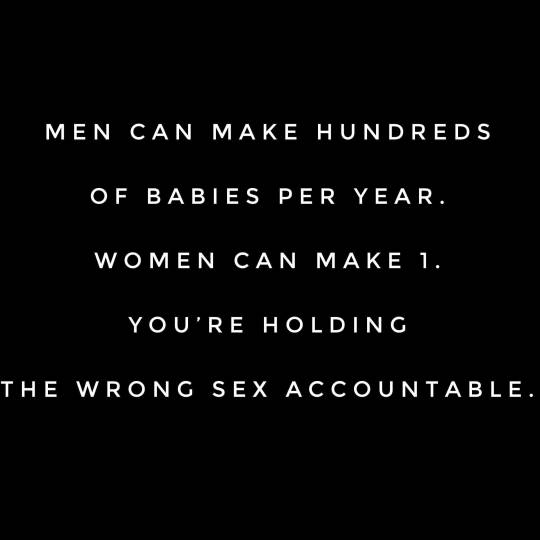
#us politics#abortions#abortion bans#roe v. wade#dobbs v. jackson women’s health organization#planned parenthood v. casey#us supreme court#scotus#trigger laws#reproductive rights#reproductive health#abortion is a human right#abortion is health care
288 notes
·
View notes
Video
youtube
How The Supreme Court Killed Roe v. Wade
0 notes
Text
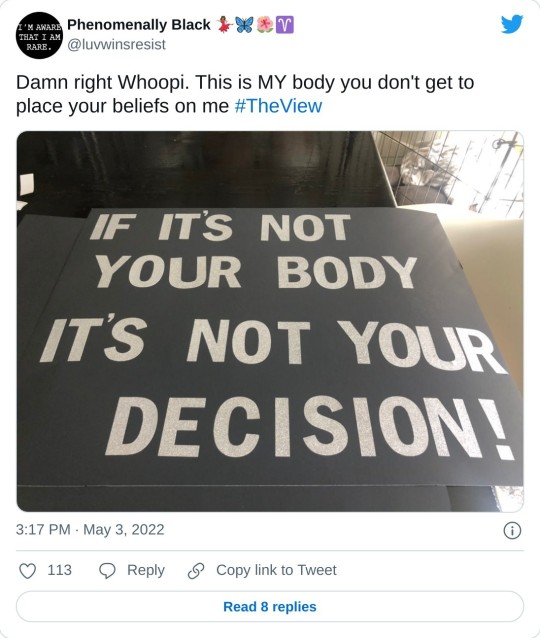
#Yes!!! 🔥🔥🔥🔥💥💥💥💥😴#Thisss#for real#yup#this this this this#honestly#this this this#us politics#news#politico#us supreme court#scotus#roe v wade#Justice Samuel Alito#planned parenthood#Planned Parenthood v. Casey#justice clarence thomas#justice neil gorsuch#justice brett kavanaugh#justice amy coney barrett#justice stephen breyer#justice Sonia Sotomayor#justice Elena Kagan#Dobbs v. Jackson Women’s Health Organization#us constitution#Justice Ruth Bader Ginsburg#laurence tribe#14th amendment#us history#2022
2 notes
·
View notes
Text
y'all the american constitution was written in 1787 at a time when:
women were seen as property
women couldn't be represented in the government
POCs were seen as property
POCs couldn't be represented in the government
same-sex marriage was banned in this country
so forgive me if I don't give a flying fuck what old, white, self-entitled men had to say 235 years ago about my rights with my body
I'm sorry I'm venting after a not-so-entertaining conversation with someone ik irl
#abortion#abortion access#abortion rights#constitution#american constitution#united states of america#america#united states#roe v. wade#roe vs. wade#roe v wade#roe versus wade#roe v casey#planned parenthood v. casey#scotus#supreme court#law#human rights#feminism#planned parenthood#shri's posts: politics#american politics#politics#usa politics
0 notes
Text
What the Overturn of Roe v. Wade Could Mean for Colleges
What the Overturn of Roe v. Wade Could Mean for Colleges
The news had been anticipated, but it was still jarring. The U.S. Supreme Court will vote to overturn Roe v. Wade, the almost half-century-old legal precedent that established access to abortion as protected by the Constitution, according to a draft opinion that was leaked to Politico and published on Monday night.
The justices are slated to issue their final ruling on the relevant case, Dobbs v.…
View On WordPress
#&x27;Dobbs v. Jackson Women’s Health Organization&x27;#Equity & Diversity#Medical Students for Choice#Pamela Merritt#Planned Parenthood v. Casey#policy#Roe v. Wade#Student Life
0 notes